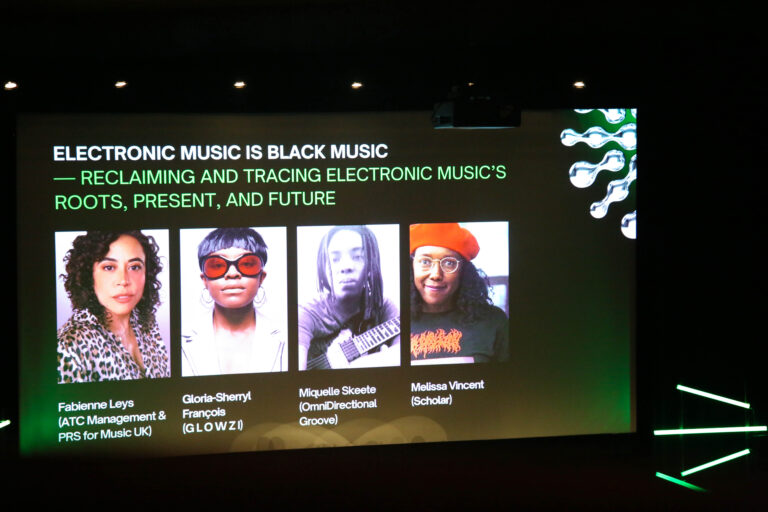Last day for MUTEK Forum, last summary for PAN M 360. We close this series with a panel close to my heart: “Electronic Music is Black Music — Reclaiming and Tracing Electronic Music’s Roots, Present, and Future”. Fabienne Leys, G L O W Z I, Miquelle Skeete alias OmniDirectional Groove, and moderator Melissa Vincent explored the deep connections between electronic music, Black culture, and counterculture. The discussion opened thoughts about how electronic music, while often mainstreamed and commercialized, remains rooted in Afro-descendant and Black cultural expressions and innovations.
Anyone familiar with electronic dance music will recognize The Belleville Three and Underground Resistance as pivotal in bringing techno to the global stage. However, this panel delves deeper, exploring the broader cultural and historical contexts that have shaped the genre and its significance through time.
As Melissa Vincent’s stated right from the beginning, having this discussion during MUTEK’s 25th anniversary is highly symbolic, as electronic music provided the very foundation upon which MUTEK was built.
To start the conversation, each panelist recounted how they first connected with electronic music, highlighting the diverse paths that led them to the genre. For Fabienne Leys, pop radio served as her introduction, particularly with the influence of Pump Up The Jam by Technotronic. G L O W Z I’s journey began with exposure to Bran Van 3000 on MusiMax. Miquelle Skeete, with her classical music background, found her pivotal moment at a Kerri Chandler show in Toronto, which offered a premiere transformative spiritual experience outside a church.
During the discussion, Melissa Vincent asked about the social conditions and contexts that have shaped the legacy, past, and future of electronic music. G L O W Z I responded by describing electronic music as a creole art form, intricately woven around the world and differing from one region to another. She highlighted South Africa’s ongoing legacy, where the Gqom genre has created a unique listening experience, especially through the use of taxis as key venues for music. Miquelle added that electronic music allows Afro-descendant people to tap into ancestral rhythms, offering a full range of emotional expression. She emphasized that, unlike other forms, electronic music provides space for both positive and tense emotions, while Afro-descendant and Black people are relegated to express only positive emotions.
The panelists discussed the multifaceted nature of what is electronic music, emphasizing that it’s not just about sound, but also about embodiment and the ability to play with textures and rhythms that might not be considered musical in other contexts. Electronic music was described as a unifying force, a source of joy, and a global phenomenon. However, Fabienne Leys noted that exclusivity and accessibility remains a significant issue within communities of color. As she highlighted, social media has helped bring regional music movements, such as Amapiano, to the forefront and we witnessed the resurgence of house music in the pop landscape with Beyoncé’s Renaissance. Yet, challenges persist, at different levels: may it be the access to material resources (electronic music gear is expensive) or the critical issue of representation within the electronic music industry, particularly among decision-makers who have the power to position artists.
That said, and in a context where different narratives are being pushed by different forces (underground vs commercial): how do we ensure the right people get recognition?
To ensure the right people get recognition in the electronic music industry, the panel emphasized the importance of having the courage to say no to corporate influence. In other words: collective efforts matter. They stressed the need to maintain spaces that are inclusive and open to all, yet protected from corporate exploitation. Refusal, in this context, is a crucial political tool to preserve the integrity and authenticity of artistic communities.
























